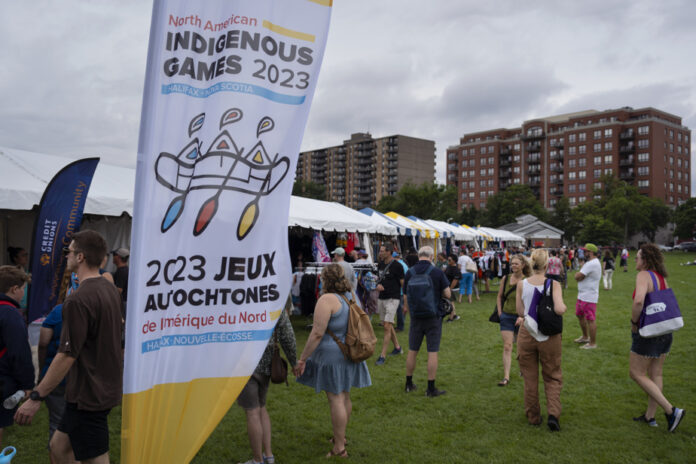(Halifax) Organizers of the North American Indigenous Games lit a sacred fire on Saturday, saying the revival of First Nations culture is at the heart of athletic competition.
“We have set ourselves the goal in these games to have 50% culture and 50% sport: so we infuse cultural aspects into all aspects of the games themselves,” said the president of the event, George Marshall, in an interview after the opening ceremony.
“Our ancestors are always present, through purification, sacred fires, sweats and ceremonies. They rose to prominence through the force of fire, which was strong from the start,” Mr. Marshall said.
This new version of the games takes place at venues in Halifax called Kjipuktuk, as well as Millbook First Nation near Truro, Nova Scotia, and Sipekne’katik First Nation, about 60 kilometers north of Halifax.
Disciplines include the traditional Aboriginal sports of canoeing, archery and indoor lacrosse, as well as soccer, softball, swimming, volleyball, wrestling, beach volleyball, rifle shooting, golf, track and field, badminton, baseball and basketball.
Indigenous ceremonies will be held at each of the sites, Marshall said. “There will be sacred smoke, elders will be on hand to comfort and counsel athletes, and our signage will display our language (Mi’kmaq). »
However, on Saturday, the bustling heart of the games was at the downtown Halifax Cultural Village, where thousands watched demonstrations of traditional woodworking, viewed a handcrafted birchbark canoe or enjoyed of a game of waltes – a Mi’kmaq dice game.
Fiona Kirkpatrick Parsons, president of the games, said in an interview that she believes the importance of cultural activities within sports competition stems from a renaissance within First Nations.
“It’s really only in recent history that we’ve been able to practice our culture, whether it’s our spirituality or our ceremonies, our dancing, our songs. It was all banned for so long,” she recalled.
“I feel like my ancestors are saying, ‘Look, we didn’t suffer for nothing. It’s time to take it back.” It’s time to take back who we are and move that forward not just for ourselves and for future generations, but for everyone we touch, all people,” she added.
The Games will bring together approximately 5,000 athletes, coaches and mission staff from more than 750 Indigenous nations across North America.















